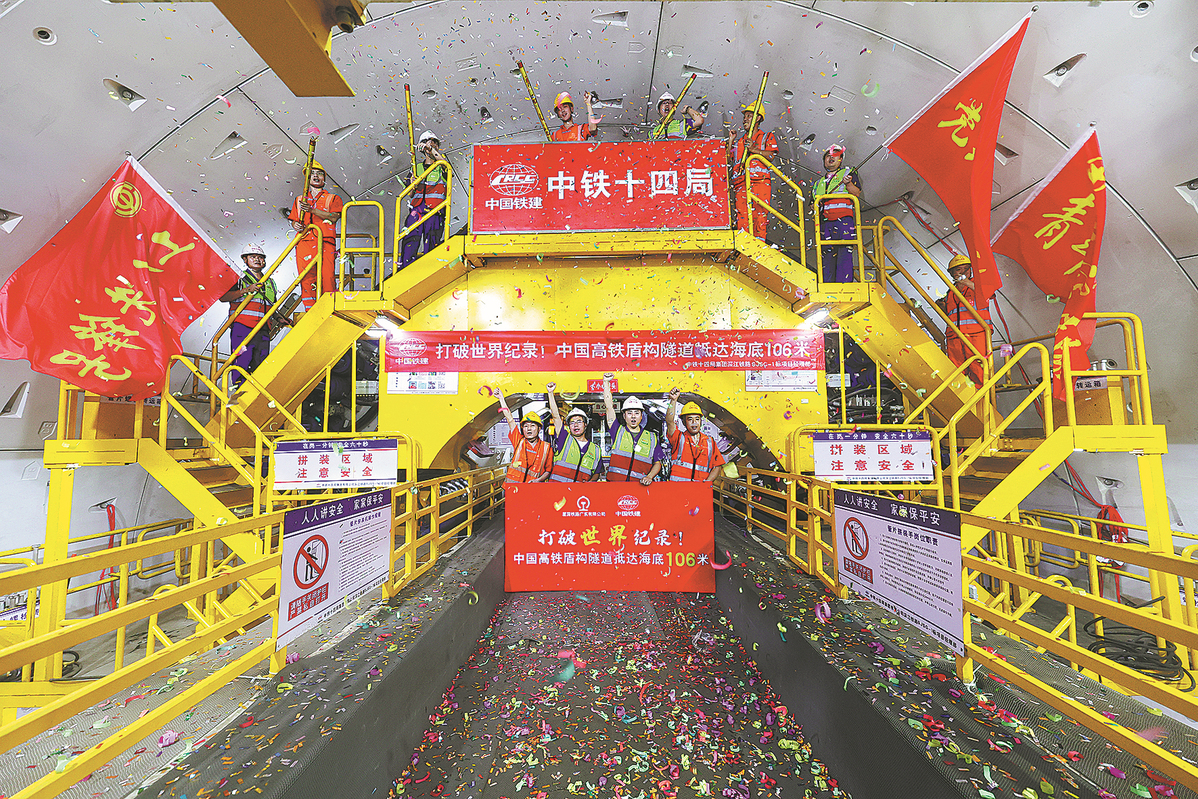Homegrown tunneling machine sets record


China has reached an engineering milestone with its domestically developed shield machine successfully completing the excavation of an underwater high-speed rail tunnel at a depth of 106 meters below the seabed in the Pearl River Estuary, according to China Railway's 14th Bureau Group, which is overseeing the project.
On Monday, the Shenjiang 1 shield machine completed its 3,590-meter excavation mission for the Pearl River Estuary Tunnel.
The tunnel, on a crucial 13.69-kilometer segment of the Shenzhen-Jiangmen Railway in Guangdong province, was built using a combination of mining and shield tunneling techniques to navigate complex geological conditions.
The shield machine, with a cutting diameter of 13.42 meters, progressed 3.59 kilometers from Dongguan to Guangzhou's Nansha district. It traversed 13 different geological strata and five complex geological formations, facing unprecedented conditions.
The tunnel's lowest point, 106 meters beneath the estuary, subjected the Shenjiang 1 to extreme water and soil pressures. The machine can withstand water and soil pressures of up to 10.6 bar, which is equivalent to a pressure of 10.6 kilograms on an area the size of a fingernail.
"This level of pressure and depth is unprecedented in China, with no existing engineering experience or design standards to guide the project," said Li Bing, an engineer from the China Railway 14th Bureau Group.
Chen Xingfei, another senior engineer with the group, said the Shenjiang 1 began its journey in December 2021, completing the excavation in 969 days. The project included a particularly challenging 490-meter fault zone with varying rock layers and high water pressures. The widest fault, measuring 32.5 meters across, added to the complexity and risk of the operation.
The Shenjiang 1 was designed for the task, incorporating advanced technologies such as high-precision circulation systems, automated pressure sealing, and sophisticated ventilation and cooling systems.
Once completed, the Shenzhen-Jiangmen Railway will stretch 116 km and operate at speeds of up to 250 kilometers per hour, linking the Guangdong cities of Shenzhen, Guangzhou, Dongguan, Zhongshan and Jiangmen. The line will significantly enhance regional connectivity, allowing travel between Shenzhen's Qianhai Free Trade Zone and Guangzhou's Nansha Free Trade Zone in just 30 minutes and boosting economic development in the Guangdong-Hong Kong-Macao Greater Bay Area.
- China's CR450: A new era of high-speed rail at 400 km/h
- TAN SUO SAN HAO to pioneer future of deep-sea exploration
- Xi's discourses on Chinese modernization published in Japanese
- Officials summoned over alleged garbage bin food served to students
- Caring hearts help to enhance quality special education
- Xi sends condolences to South Korean acting president over plane crash




































